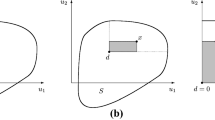Abstract
In this paper, a survey of bargaining theory is presented. First, an axiomatic approach to bargaining problems is considered. I describe the Nash solution to bargaining problems, and present an example of an application of this solution. Some other solutions to bargaining problems, such as the egalitarian solution, the utilitarian solution, and the solution proposed by Kalai and Smorodinsky, are also mentioned. Next, I describe the strategic approach to the bargaining problem. Rubinstein’s bargaining game of alternating offers, the form of Nash equilibria, and the subgame perfect equilibrium of this game are presented. I also describe two special bargaining models with stationary preferences of the players. Moreover, several generalizations of Rubinstein’s model, including models with non-stationary preferences of the players, are presented. Finally, I mention some applications of dynamic bargaining models.
Access this chapter
Tax calculation will be finalised at checkout
Purchases are for personal use only
Preview
Unable to display preview. Download preview PDF.
Similar content being viewed by others
References
Baron, D.P., Ferejohn, J.A.: Legislatures. American Political Science Review (1989)
Fershtman, C.: A Note on Multi-Issue Two Sided Bargaining: Bilateral Procedures. Tel Aviv University, Working Paper No. 6-98 (1989)
Fishburn, P.C., Rubinstein, A.: Time Preferences. International Economic Review 23, 667–694 (1982)
Houba, H., Sneek, K., Vardy, F.: Can Negotiations Prevent Fish Wars. Discussion Paper, Tinbergen Institute (1996)
Kalai, E., Smorodinsky, M.: Other Solutions to Nash’s Bargaining Problem. Econometrica 43, 513–518 (1975)
Klemisch-Ahlert, M.: Bargaining in Economic and Ethical Environments. An Experimental Study and Normative Solution Concepts. Springer, Berlin (1996)
Morrow, J.D.: Game Theory for Political Scientists. Princeton University Press, Princeton (1994)
Muthoo, A.: Bargaining Theory with Aplications. Cambridge University Press, Cambridge (1999)
Nash, J.: The Bargaining Problem. Econometrica 18, 155–162 (1950)
Osborne, M.J., Rubinstein, A.: Bargaining and Markets. Academic Press, San Diego (1990)
Rubinstein, A.: Perfect Equilibrium in a Bargaining Model. Econometrica 50, 97–109 (1982)
Rusinowska, A.: Bargaining Problems with Preferences Varying in Time. Journal of the College of Economic Analyses, No. 6 - Problems of Mathematical Economics and Financial Mathematics, Warsaw (1998) (in Polish)
Rusinowska, A.: Bargain. In: Collective Decisions. Theory and Applications. Publishing house - Scholar, Warsaw, pp. 139–156 (1999) (in Polish)
Rusinowska, A.: Bargaining Problem with Non-stationary Preferences of the Players. Ph.D. Thesis, Warsaw School of Economics, Warsaw (2000) (in Polish)
Rusinowska, A.: On Certain Generalization of Rubinstein’s Bargaining Model. In: Petrosjan, L.A., Mazalov, V.V. (eds.) Game Theory and Applications, vol. 8, pp. 159–169. Nova Science Publishers, Inc., New York (2002)
Rusinowska, A.: Subgame Perfect Equilibria in Model with Bargaining Costs Varying in Time. Mathematical Methods of Operations Research 56, 303–313 (2002)
Rusinowska, A.: Bargaining Model with Sequences of Discount Rates and Bargaining Costs. International Game Theory Review (2002) (to appear)
Selten, R.: Reexamination of the Perfection Concept for Equilibrium Points in Extensive Games. International Journal of Game Theory 4, 25–55 (1975)
Author information
Authors and Affiliations
Editor information
Editors and Affiliations
Rights and permissions
Copyright information
© 2003 Springer-Verlag Berlin Heidelberg
About this chapter
Cite this chapter
Rusinowska, A. (2003). Axiomatic and Strategic Approaches to Bargaining Problems. In: de Swart, H., Orłowska, E., Schmidt, G., Roubens, M. (eds) Theory and Applications of Relational Structures as Knowledge Instruments. Lecture Notes in Computer Science, vol 2929. Springer, Berlin, Heidelberg. https://doi.org/10.1007/978-3-540-24615-2_7
Download citation
DOI: https://doi.org/10.1007/978-3-540-24615-2_7
Publisher Name: Springer, Berlin, Heidelberg
Print ISBN: 978-3-540-20780-1
Online ISBN: 978-3-540-24615-2
eBook Packages: Springer Book Archive




